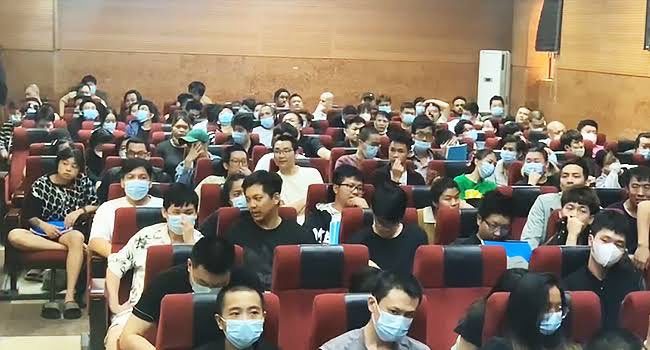Crime and Law
Court orders remand of 109 foreign cybercrime suspects in Kuje prison

The Federal High Court in Abuja has ordered the detention of 109 foreign nationals, accused of cybercrime, hacking, and activities endangering national security, at Kuje and Suleja correctional facilities.
Justice Ekerete Akpan issued the order on Friday after defense counsel argued that the police detention facility was unsuitable for the suspects’ accommodation.
The arraignment of the suspects, initially scheduled for November 11, was delayed due to misrepresentation of names on the charge sheet and a lack of legal representation. Additional complications arose as some defendants required interpreters to follow the court proceedings.
Defense counsel Ogwu Onoja emphasized the need for interpreters for defendants who do not understand English, while Eric Oba, representing Brazilian defendants, requested their separation from other accused persons. However, the court declined the separation, citing the absence of a formal arraignment.
The case has now been adjourned to November 29 to allow the suspects to secure legal representation. This follows an earlier adjournment when no legal counsel was available for the accused.
The suspects, comprising citizens of China, Indonesia, Vietnam, the Philippines, Thailand, Brazil, Malaysia, and Myanmar, face a six-count charge brought by the Nigeria Police Force. They were arrested at a property in the Katampe District of Abuja, allegedly used as a base for cybercrime activities.
In addition to cybercrime, the charges include money laundering and illegal residency in Nigeria.
In the charge before the court, marked: FHC/ABJ/CR/599/2024, police, alleged that the defendants conspired among themselves “to commit an offence, to wit; cybercrime and you thereby commited an offence contrary to and punishable under section 27 (1) (b) of the Cybercrimes (Prohibition, Prevention, Etc) Act, 2015 (As Amended, 2024).”
They were also alleged to have “knowingly access a computer and network and input, alter, delete of suppress data resulting in inauthentic data with the intention that such inauthentic data will be considered or acted upon as If they were authentic or genuine and you thereby commit an offence contrary to and punishable under section 13 of the Cybercrimes (Prohibition, Prevention, Etc) Act, 2015 (As Amended, 2024).”
Police told the court that the 109 defendants, “knowingly and without authority, caused loss of property to persons in Nigeria and outside Nigeria,” when they caused the inputting and suppression of data by deceiving people to believe that an unregistered gambling platforms they were marketing, were authentic.
It alleged that the deceptive action of the defendants was for them to confer economic benefits on themselves, thereby committing an offence contrary to and punishable under section 14 (1) of the Cybercrimes (Prohibition, Prevention, Etc) Act, 2015 (As Amended, 2024).
More so, the prosecution alleged that the defendants, with intent to defraud, “did promote via electronic Messages on the internet, a fraudulent and unregistered gambling platform, materially misrepresenting facts about the said fraudulent gambling platform upon which reliance, persons in Nigeria and outside Nigeria suffered enormous economic losses and you thereby commit an offence contrary to and punishable under section 14 (2) of the Cybercrimes (Prohibition, Prevention, Etc) Act, 2015 (As Amended, 2024).”
They were also alleged to have removed from Nigeria, “proceeds generated from operating a fraudulent and unregistered gambling platforms, namely: 9f.com, c2.top, 8pg.top and you thereby commit Money Laundering, contrary to and punishable under section 18 of the Money Laundering (Prevention and Prohibition) Act, 2022.”
Likewise, the defendants were accused of entering “the territory of the Federal Republic of Nigeria with a business permit of 30 days duration and failed, or neglected to leave the Nigerian territory at the expiration of the said permit and remained in Nigeria without a valid resident permit or appropriate valid visa and you thereby contrary to section 4 (2) and punishable under section 44 (1) (c) of the Immigration Act 2015.”





















